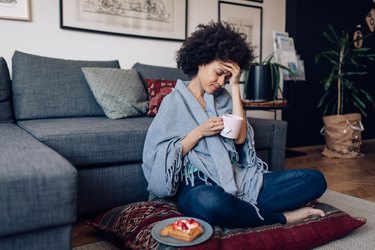
In times of stress, you may find a warm cup of tea comforting. Different teas have different properties and benefits, which means certain brews are more ideal for coping with stress and managing anxiety.
"Since ancient times, people have been using herbal teas to boost their health, reduce stress, anxiety and sleep better," says registered dietitian-nutritionist Mehak Naeem, RDN. "Tea affects everyone differently due to differences in taste and stress levels. So, finding the proper tea may take a few attempts."
Video of the Day
Video of the Day
If you're looking for a tea that promotes calmness, tranquility and rest, you may have success with these dietitian-recommended picks. Keep in mind that drinking tea alone likely won't eliminate your tension — reducing stress requires a combination of habits, and drinking calming teas can certainly help.
1. Green Tea
Known for being a potent source of antioxidants, green tea can also help with stress. Registered dietitian Marie Spano, RD, CSSD, recommends caffeine-free green tea rich in theanine, an amino acid known for having soothing effects.
"Caffeine-free green tea naturally contains theanine, an amino acid that helps reduce stress," Spano says. "While studies examining theanine have used much higher doses (200 to 250 milligrams) than those found in a single cup of green tea, research suggests green tea can effectively lower stress."
The anti-stress effects of theanine have been confirmed by scientific studies, but these effects can sometimes be blocked with high amounts of caffeine. Low-caffeine green tea can suppress stress response, according to a small June 2017 study in the Biological and Pharmaceutical Bulletin.
Green tea is also associated with reduced anxiety, according to an October 2017 review in Phytomedicine: International Journal of Phytotherapy and Phytopharmacology.
Green Tea to Buy
2. Black Tea
There are many benefits of drinking black tea, and reducing your stress levels may be one of them.
"Black tea naturally contains both theanine and caffeine. Combined, this duo has been shown to produce a dose-dependent alert yet relaxed state," Spano says. "While studies have generally used more caffeine and theanine than found in a typical glass of black tea, research shows regularly drinking black tea can help decrease stress."
Drinking black tea daily helps improve relaxation and lower cortisol levels, according to a January 2007 study in Psychopharmacology. Sipping on black tea may aid stress recovery, per the researchers.
Black Tea to Buy
3. Ashwagandha Root Tea
Ashwagandha is a type of herb that belongs to the family of nightshades. It's been used for centuries in traditional Ayurvedic medicine. While it's often used to increase energy, one of the benefits of ashwagandha is stress relief.
"Ashwagandha root tea is a wonderful option for supporting stress reduction. Ashwagandha is one of many different types of adaptogens, a class of herbs shown to reduce the stress response in humans," says registered dietitian and clinical herbalist Jenna Volpe, RDN, LD.
Studies have shown that ashwagandha root is helpful in relieving stress, anxiety and sleep issues. In fact, it's shown to lead to better sleep quality and lower stress levels, according to a December 2019 study in Cureus.
When taken consistently over 8 weeks, ashwagandha root extract was significantly helpful in reducing stress and anxiety as well as supporting better sleep. Taking ashwagandha root daily has also been shown to reduce the stress hormone cortisol by almost 25 percent, according to a September 2019 study in Medicine.
It's worth noting that taking ashwagandha every day for a prolonged period of time is way more effective than sipping a cup of tea here and there when you're stressed. These studies suggest that taking ashwagandha daily might help curb stress in the first place.
Ashwagandha Tea to Buy
4. Lemon Balm Tea
Lemon balm tea has been touted as one of the best natural remedies for anxiety. It's a medicinal herb that may have anti-anxiety properties.
"Lemon balm is a great tea option for aiding in stress reduction," Volpe says. "It's often used by herbalists to support people with stress and anxiety, and it's even safe for children." Lemon balm is linked to lower rates of anxiety and depression symptoms with little to no side effects, according to a December 2021 review in Phytotherapy Research.
There's also preliminary research that supports lemon balm's ability to reduce symptoms of anxiety, such as nervousness, according to the Mayo Clinic. While it's generally well-tolerated, it can cause nausea and abdominal pain.
Lemon Balm Tea to Buy
5. Chamomile Tea
You may have reached for a warm cup of chamomile tea before bed. It's known for benefits related to stress relief, tension headaches, relaxed muscles and sleep.
"Chamomile is a well-known soothing herb whose aromatic properties make it ideal for any time of day," Naeem says.
For those who need help calming down for bed, chamomile is like a mild tranquilizer, according to Cleveland Clinic. It reduces anxiety, encourages calmness and promotes drowsiness.
- Biological and Pharmaceutical Bulletin: "Anti-stress Effect of Green Tea with Lowered Caffeine on Humans: A Pilot Study"
- Phytomedicine: International Journal of Phytotherapy and Phytopharmacology: "Green tea effects on cognition, mood and human brain function: A systematic review"
- Psychopharmacology: "The effects of tea on psychophysiological stress responsivity and post-stress recovery: a randomised double-blind trial"
- Cureus: “Adaptogenic and Anxiolytic Effects of Ashwagandha Root Extract in Healthy Adults: A Double-blind, Randomized, Placebo-controlled Clinical Study”
- Medicine: “An investigation into the stress-relieving and pharmacological actions of an ashwagandha (Withania somnifera) extract”
- Phytotherapy Research: "The effects of lemon balm (Melissa officinalis L.) on depression and anxiety in clinical trials: A systematic review and meta-analysis"
- Mayo Clinic: “Herbal treatment for anxiety: Is it effective?"
- Cleveland Clinic: “The Best Teas to Drink for Your Health”
Was this article helpful?
150 Characters Max
0/150
Thank you for sharing!
Thank you for your feedback!